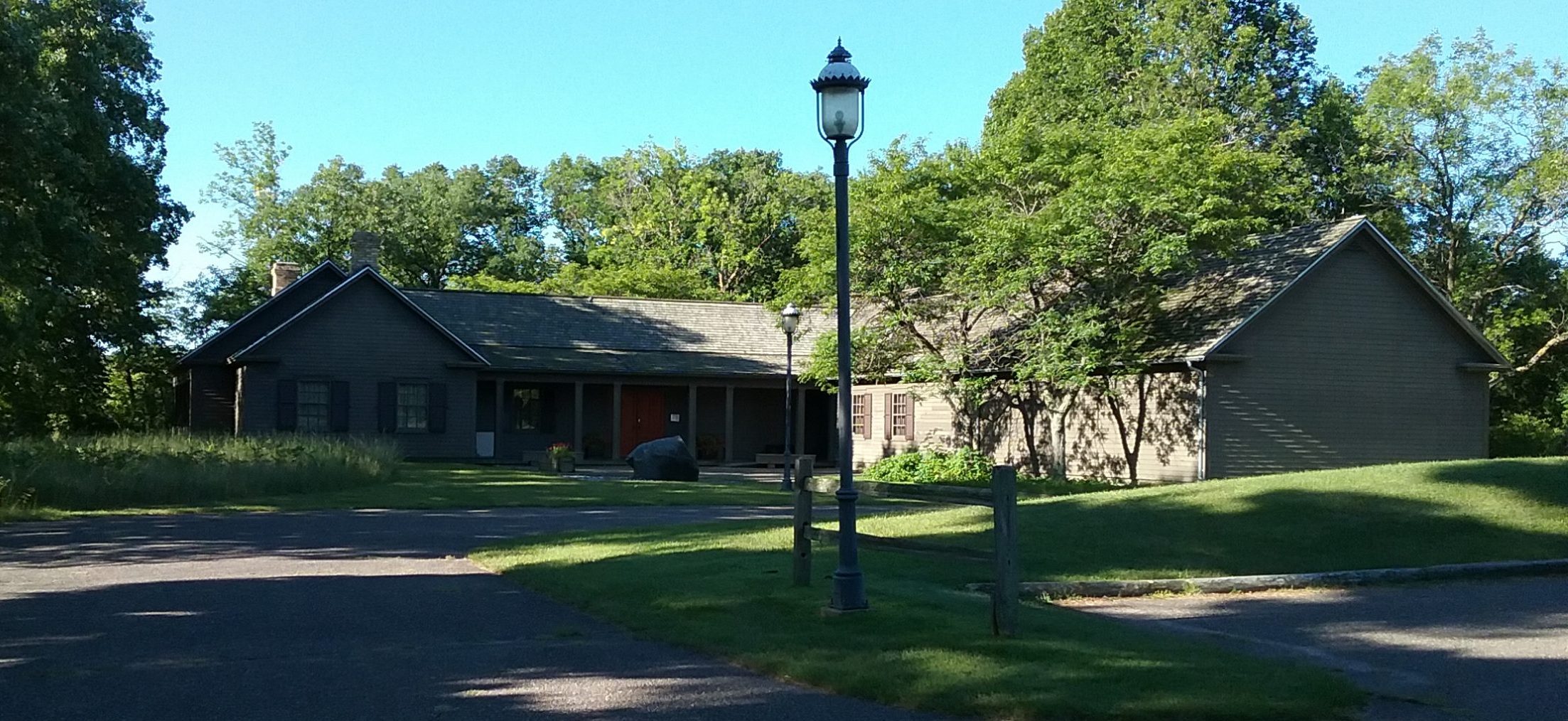The tall rusty windmill squeaks as the wind catches it. It towers over a homestead rich in history. Its eerie sounds are reminders of a time one hundred fifty years ago when Red River ox carts passed by, their squeaking wheels announcing their arrival. The Warren-MacDougall Homestead, the name it bears today, is situated on a stretch of land bordered on the west by the Mississippi River and on the east by what was once the old ox cart trail.
In the 1850s, several families of Scotch-Canadian descent began to arrive in the area that later became Bellevue Township. Most prominent among those families were the MacDougalls. Donald, Duncan, James and their families were the earliest MacDougalls to arrive. In her WPA biography of the 1930s, Marjory MacDougall Bullard, daughter of Donald and Sarah MacDougall, describes many incidents relating to her childhood. She speaks of climbing on the fence to watch the ox carts go by, carrying their loads of furs being taken to St. Paul. On the return trip the carts were loaded with supplies, groceries and dry goods for the settlers. She said, “You could hear them coming a long ways off, squeak, squeak, squeak.” Marjory also tells of a grasshopper invasion that left them without food, of Indians nearby, and of watching the young men drilling in preparation for the Civil War.
Peter and Martha MacDougall arrived from Canada in 1873. It is their place that has been preserved by The Nature Conservancy as the Warren-MacDougall Homestead. It is their squeaking windmill that is one of the remnants of this magnificent place. The house, chicken coop and machine sheds are all in disrepair. The barn is the architectural showpiece of the site.
A protective skin of galvanized metal, a later addition, hides the original wood exterior of the building. Step inside and you are transported back in time to timber framing, mortise and tenon joinery, and hand hewn wood. The barn was built in the 1870s from timber tall enough and large enough to square out for a large beam the entire width of the barn.
A depression in the farmyard, overgrown with grass, marks the site of William W. Warren’s cabin. Warren’s History of The Ojibway Nation was written in about 1850 while he lived at this place. It is the best known of all histories of the Ojibway Nation. Warren was an eloquent and fluent speaker of both Ojibway and English. He served as interpreter for the Treaty of Fond du Lac in 1847. In 1851 he took his seat in the House of Representatives in the Minnesota Territorial Legislature. Warren was in the process of seeking funds to have his manuscript published when he died at his sister’s home in St. Paul. He was only 28 years old.
In spite of the fact that the land was farmed over a period of many years, much of the environment William Warren enjoyed remains today. A diverse woodland follows the bank of the Mississippi River. It contains hardwoods where Warren once gathered maple sap, cedar trees and a grove of towering pine. The pines became a rookery for the Great Blue Herons who nested on the nearby island before moving to the grove. Where the MacDougalls had farm fields, The Nature Conservancy has begun a prairie restoration. Next to the high bank where the farmstead is located, the land dips down to a meadow. A small stream trickles its way to the Mississippi. Birds, animals and bugs live contentedly in this beautiful habitat where only they reside. When we go there we are their guests and must respect their home.
The squeaking windmill seems in harmony with the songs of birds and the sounds of animals in the night. Thanks to The Nature Conservancy this enchanting place has been preserved.
by Jan Warner
Copyright 1998, Morrison County Historical Society

My mother, (Katherine DuFrene) was from the MacDougall clan that lived there. When the last MacDougall died (Rose) my mother inherited the land. She had several offers from builders that wanted to buy it and build houses on it but she wanted it to remain as is and that is when she sold it to Nature Conservancy. My brothers and I have fond memories of playing in the woods down by the Mississippi River and in the barn. Sadly vandals got into the house, it caught fire and burned down.
Thank you for the information, Susan! MCHS Staff
Your mother’s vision and wisdom is appreciated through the ages. I visit the place quite regularly it’s very special place to me it’s. It’s sacred even and each year I go down there in the winter to see the swans. it’s such a pretty spot and it’s so unique with all the different landscapes converging. The craftsmanship of the barn is incredible and one with any sense of imagination can sit there and wonder I think I’m out of Labor it took and ponder one’s place in this modern world and really put a bluntly how soft we’ve gotten. I can see the inscriptions in the doorway noting the harvest in bushels of rye and other grains still there for anyone to see.
Thank you and your mother.